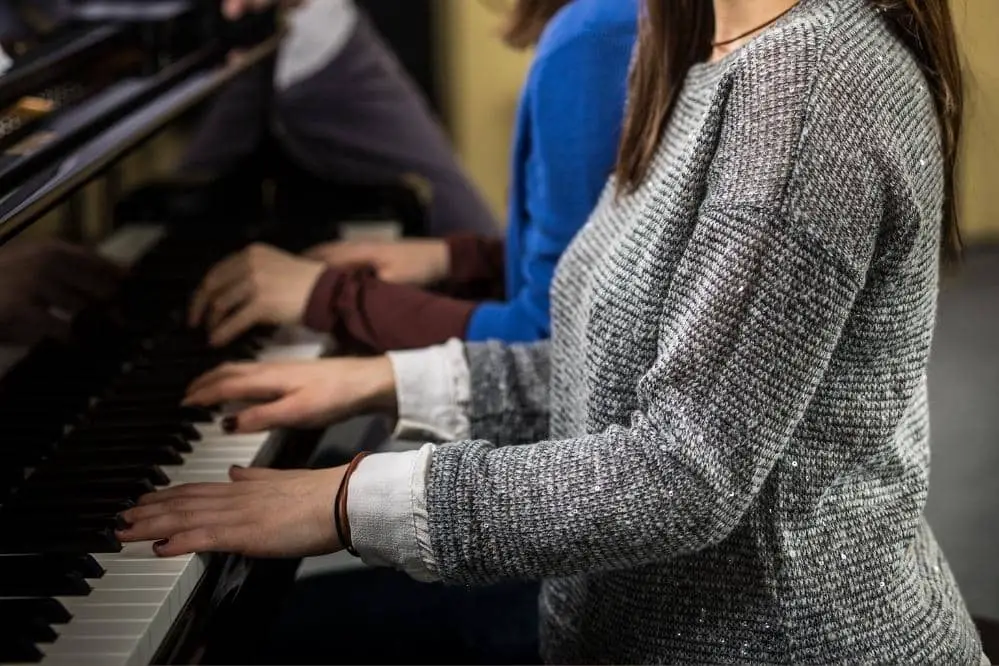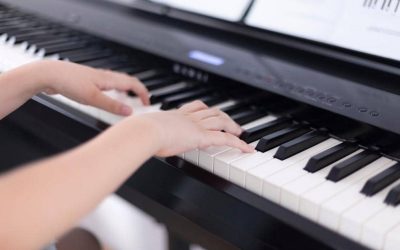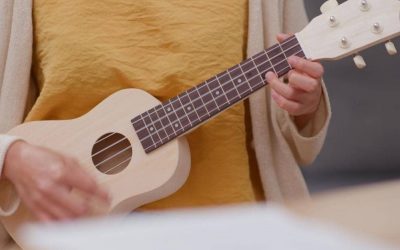One of the best feelings in the world is playing a beautiful piece of music on the piano, with the touch of the keys underneath your fingers and the notes surrounding you. This feeling can be enhanced even more when playing a piece alongside someone else who is perfectly in sync with you, but it can also prove to be more challenging to do.
As far as playing piano duets goes, for the best results, there are some tips that need to be taken into account. Keep in mind that although there are only seven pointers included in this article, there are endless tips and tricks that exist for improving your piano duet playing skills.
1. Good Communication
Anyone who has ever played music with one or more people knows that it is extremely important to listen intently to what each of the other musicians are doing. This is key to staying in sync with each other.
However, many people may disregard the importance of the innumerable forms of communication musicians can use to stay on the same page. Some examples of communication signals include head movements, hand gestures, facial twitches, winks, and even variations in breathing.
There is no end to methods of communication. You and your partner have the opportunity to get very creative with this aspect of playing piano duets.
2. Know Your Part
Before attempting to perfect playing a piece of music with your duet partner, you should make sure to get your part of the piece down very well.
This will help prevent you from wasting your partner’s time while you try to learn the piece alongside learning how to perfect playing it with them. By getting your part down prior to trying to do a duet, you will also be able to put all of your focus into you and your partner’s parts together.
3. Don’t Rush While Practicing
As with any skill you are trying to improve on, you should take your time in learning the details when you are practicing your piano duet.
When you and your partner are in the midst of practicing the duet, make a point to be patient with the process, and try to encourage your partner to take things slowly as well. You can more easily perfect your duet if you approach practicing in this way.
4. Count Beats
Although this tip is good to follow when playing a piece of music solo or with others, it is arguably even more vital when playing with one or more people.
If you can’t stay in rhythm, which is far easier to do when you count beats in the music you are playing, then it can prove to be almost impossible to remain in sync with your partner.
One way to help you and your partner stay in rhythm is by setting a metronome near to where you are playing piano. This is a tool that can greatly improve your duet playing, and it is often ignored by musicians.
5. Practice Regularly
Consistent practice makes perfect in anything you are trying to excel in, and duet piano playing is certainly no exception. In fact, some might argue that regular practice is actually more important when playing a piece of music with others.
One reason why this is so is because there is a higher chance of an error happening when more than one person is involved in playing a piece of music. Along with this, not only are you required to focus on the part of the music that you are playing, but you need to also pay attention to what your partner is playing to stay in sync with each other.
Trying to focus on more than one thing at a time can be confusing for your brain, and practicing will provide you with the ability to play your part without thinking about it, leaving you more capable of focusing on what your partner is doing.
6. Do Not Stop Playing
It is a smart idea to make an agreement with your partner that even if one of you makes a mistake, you will both continue playing the piece of music all the way through to the end.
If you stop playing every time someone misses a note or makes a similar error while playing, it will slow your practice down dramatically, and it is not helpful whatsoever to stop playing. As long as you keep practicing, you should be able to overcome making small mistakes eventually and play the piece without any errors.
7. Have Fun Together
This could be considered as the most important tip of all when it comes to both playing music alone and with others—have fun. Always make sure you enjoy what you are doing because what is the point in doing it, otherwise?
If you have fun while playing piano duets with your partner, not only will you have a blast, but you will end up playing better and in a way that is more electrically charged, as your emotions will be involved.
Conclusion
The most important thing to take away from this article is the fact that practice, patience, and getting enjoyment from playing piano are all key to executing a flawless duet with your partner. If you make sure you follow the tips that are outlined above, your audience is sure to give you a standing ovation.






